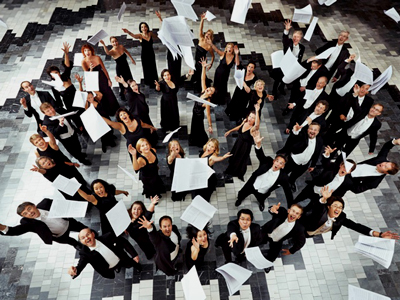
By ANDREW POWELL
Published: August 29, 2014
MUNICH — Staged works and the legendary Lied evenings hold the limelight here at the annual Opernfestspiele, begun 139 years ago. But veins of chamber music and, since 2008, choral programming run through the five-week schedule, lending scope and affirming organizer Bayerische Staatsoper’s depth of musicianship. The chamber offerings can be hit or miss, depending on the precise collaborations of Staatsorchester members and their scores; string trios on July 24 proved a hit. The choral initiatives attempt to thread back to the company’s 16th-century roots as a Kantorei, drawing on Staatsopernchor members passionate about church repertory; Rossini’s Petite messe solennelle on July 23 proved a stretch.
David Schultheiß (violin), Adrian Mustea (viola) and Allan Bergius (cello) teamed collegially at the ornate Cuvilliés Theater. Their nervous way with Beethoven’s C-Minor Trio from Opus 9 left the 1798 piece sounding brittle and oddly pale, but in Dohnányi’s charming, unpredictable, five-movement Serenade in C (1902) things shifted into vibrant high gear underpinned by Bergius (who once had another career), peaking in the chromatically salted Scherzo. Mozart’s E-flat Divertimento, K563 (1788), with its searching Adagio and rich minuet movements, served as flattering vehicle for the stylish and technically assured work of Schultheiß, one of the orchestra’s concertmasters. Mustea’s unusually resonant viola, here and throughout, provided a firm sense of ensemble and ensured a memorable night.
The 1863 Mass was a feasible festival choice for the reborn “Münchner Hofkantorei,” not needing an orchestra. Even so, its ironic jolts and the matter of choral direction versus leadership by the principal piano tended to defeat efforts at the Court Church of All Saints. Staatsopernchor member Wolfgang Antesberger aptly paced the score and directed robust performances of the Gloria and Credo choruses. But Rossini leaves much of the initiative to the first pianist, requiring bold propulsion and phrasing that Sophie Raynaud at times lacked, although her Prélude religieux took good shape. Solo singing varied widely in quality and approach.
Photo © Wilfried Hösl
Related posts:
Horn Trios in Church
Blacher Channels Maupassant
Manon, Let’s Go
Mahler 10 from Nézet-Séguin
Verdi’s Lady Netrebko
